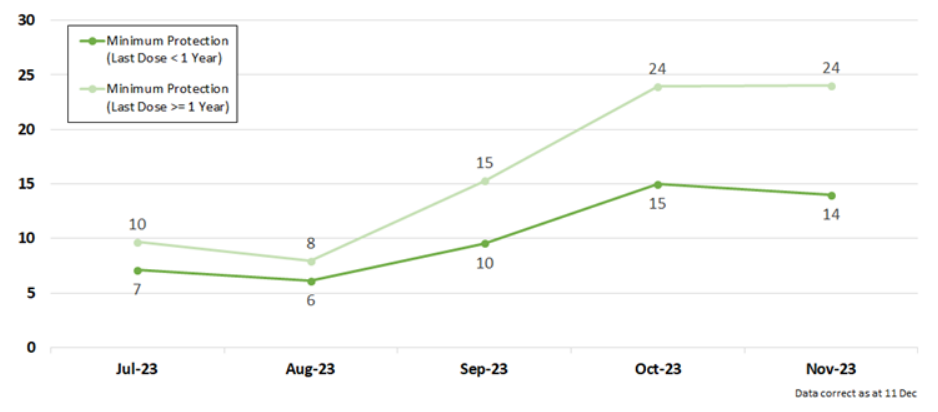MOH Issues Urgent Guidelines as Singapore Grapples with Alarming Surge in JN.1 Sublineage COVID-19 Cases
It’s that time of year again, when you wake up one day with the dreaded tickling at the back of your throat. Your heart sinks as one question immediately pops into your head.
“Did I kenna COVID?”
Tis the Season to be Socially Responsible and Vigilant!
As the number of COVID-19 infections surges, the Ministry of Health (MOH) is taking proactive steps to safeguard healthcare capacity and manage the escalating situation.
Before we fully immerse ourselves into the festive season (and the crowds along Orchard Road), put on a mask and take some time to read up on the updates posted by MOH on 15 December 2023.
Here is the comprehensive breakdown.
Alarming Increase JN.1 Sublineage Cases
The week of 3 December to 9 December 2023, witnessed a significant spike in COVID-19 cases, soaring to 56,043 compared to 32,035 cases the previous week.
Daily hospitalizations rose from 225 to 350, with Intensive Care Unit (ICU) cases doubling from four to nine per day.

JN.1, a sublineage of BA.2.86, is currently the predominant cause of COVID-19 cases in Singapore, accounting for over 60% of such cases as of 8 December 2023.
The BA.2.86 and its sublineages have been classified as a Variant of Interest by the World Health Organization since 21 November 2023.
The strain was first identified in Luxembourg and then later spread to Britain, Iceland, France and the US.
According to the Centres for Disease Control and Prevention (CDC), the JN.1 variant accounts for one-fifth of the cases in the United States, when it made up less than 0.1% of cases in late October.
While it may suggest that the strain may be more transmissible or able to slip past our immune systems, there is still no clear evidence suggesting increased transmissibility.
It is also not currently known whether JN.1 infection produces different symptoms from other variants.
As much as we hate to say it, it is predicted that the JN.1 variant is here to stay over the holiday season.
Public Advised to Mask Up and Exercise Social Responsibility.
MOH advised individuals with acute respiratory infection (ARI) symptoms to stay at home until symptoms resolve.
ARI symptoms consist of: fever, cough, runny nose, sore throat, loss of taste or smell.
If you are unable to stay at home while unwell, you should wear a mask, practice good personal hygiene, avoid crowded spaces and minimise social interaction.
MOH also recommends wearing masks in crowded settings, for those without symptoms, especially for indoor settings or when interacting with vulnerable persons.
For the travel bugs, MOH advises adopting the relevant travel precautions, such as wearing a mask at the airport, purchasing travel insurance, and avoiding crowded areas with poor ventilation. They can visit MOH’s Health Advisory for Travellers for more information.
MOH urges the public to seek medical treatment at a hospital’s Emergency Department only for serious or life-threatening emergencies.
Vaccinations Prove Effective in Curbing COVID-19 Spread
MOH stressed that vaccination is the most essential and primary defence against preventing COVID-19 and its many variants, including JN.1.
Analysis shows that hospitalisation rates are significantly lower among those up-to-date with COVID-19 vaccinations.
Between 1 July and 30 November 2023, individuals who failed to maintain current COVID-19 vaccinations are 1.6 times more prone to severe COVID-19 necessitating hospitalisation or ICU admission compared to those who remained up-to-date with vaccinations, where the rate stood at 10.4 cases per 100,000 population.

Individuals aged 60 and above, medically vulnerable persons, and those in aged care facilities are strongly encouraged to update their vaccinations if their last dosage was more than a year ago.
Individuals aged six months and above are strongly encouraged to receive an additional dose, with a special emphasis on healthcare workers and individuals serving as household members or caregivers for those who are medically vulnerable.
The updated COVID-19 XBB.1.5 Pfizer-BioNTech/Comirnaty and Moderna/Spikevax vaccines are still available for free at Joint Testing and Vaccination Centres, Public Health Preparedness Clinics, and selected polyclinics.
You can refer to https://gowhere.gov.sg/vaccine for the nearest vaccination site and the types of vaccines offered at each site.
Other Measures Taken to Manage New Wave
To preserve healthcare capacity, MOH is collaborating with public hospitals on contingency planning.
This includes ensuring sufficient manpower, deferring non-urgent electives to maximise bed capacity for urgent cases and those in need of acute care, and leveraging alternative care models and facilities like Transitional Care Facilities and Mobile Inpatient Care@Home.
Additionally there will be a new COVID-19 Treatment Facility (CTF) at Singapore EXPO Hall 10 this weekend, to increase CTF capacity.
The existing facility at Crawfurd Hospital will be operational this weekend as well.
Both facilities will be able to accommodate up to 80 stable COVID-19 patients who do not require intensive hospital care.
MOH says that capacity at the EXPO Hall 10 facility can be increased should the need arise.
Daily Updates on COVID-19 Statistics
Currently, MOH provides weekly updates on the COVID-19 case numbers.
To provide more timely information, MOH’s website will be updated daily starting from 19 December 2023.
However, as routine testing is no longer required in DORSCON Green, this could potentially lead to an under-representation of the actual situation.
The MOH website will consider factors like ARI attendances at polyclinics and positive COVID-19 cases to derive a more accurate estimate.
Despite the challenges posed by the current surge, Singapore has demonstrated resilience in previous waves, MOH said.
The public is urged to play a part in protecting themselves, their families, especially seniors and medically vulnerable persons, reinforcing the collective effort needed to overcome the current wave of infections.




